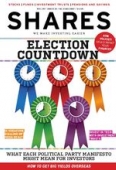Archived article
Please note that tax, investment, pension and ISA rules can change and the information and any views contained in this article may now be inaccurate.
Investment trusts with a technology edge

Big technology companies have become hugely influential over past few decades. Technological advances have revolutionised our lives, changing the way we shop, communicate, work and even date, thanks to the internet’s ability to connect people like never before.
It’s no wonder that investors have flocked to the technology in hope of profiting from this favourable industry backdrop.
Names like Apple, Facebook and Google have become part of the everyday lexicon – either as individual stocks in people’s portfolios or core holdings in many funds or investment trusts. We’ll get to investment trusts in a minute; just hear us out on a few points first.
Investors looking for technology options have little choice among FTSE 100 stocks. There are only two constituents in this space, being accountancy software supplier Sage (SGE) and infrastructure IT firm Micro Focus (MCRO).
It’s a very different story on a global scale. For example, the five biggest companies in the S&P 500 by market capitalisation are all tech stocks, exerting 12.8% of the index’s weighting (or influence on the S&P’s direction) from just 1% of its constituents.
Simple questions
Before deciding to take the technology plunge investors should consider some basic questions. First, you should reconsider the economic cycle. Technology stocks have typically enjoyed steep peaks followed by sharp declines. This makes valuation another important point to think about.
The dot-com boom and bust of the late 1990s and early 2000s was a stark illustration of how markets can initially get carried away sending share price soaring on promises of huge profit potential that ultimately fail to materialise. Is there a clear source to revenue and earnings growth?
It is also worth asking if technology companies have an opportunity for a long game, not simply a fashionable flash in the pan. For every Microsoft, for example, there are hundreds of Blackberry’s or Yahoo’s which are struggling to survive.
Investment trust options
Picking the winners can be a difficult job, which is why it can pay to turn to the experts for help. By that, we mean using investment trusts or funds where you can access years of experience from seasoned experts.
There are three main options for investment trust fans, being Allianz Technology Trust (ATT), run by Walter Price; Katie Potts’ Herald Investment Trust (HRI); and Polar Capital Technology Trust (PCT), managed by Ben Rogoff.
The trio have combined assets under management worth £2.35bn (Allianz £255m, Herald £844m and the biggest, Polar with £1.25bn).
Allianz and Polar share many strategic similarities. Both try to identify transformational and disruptive long-term trends, and buy companies capable to dominating those spaces.
Apple, Amazon, Facebook and Microsoft all feature in their respective top 10 holdings; as does Salesforce. This business is less well known but a market leader in marketing and customer relationship management (CRM) enterprise tools and services.
Backing such companies has really paid off for investors. Over the past five years the Allianz share price has increased by 231%; while Polar’s performance has been also as impressive, up 180%.
One area when Rogoff and Price differ is China. Polar holds decent stakes in Chinese tech firms Tencent (a sort of Chinese Google) and Alibaba (the equivalent of Amazon, in general terms), and Allianz largely steers clear.
The main reason is the government, which can become a bit of a back-seat driver of companies in which it holds a stake.
Different beast
Herald Investment Trust has an alternative investment philosophy. Instead of chasing mass market themes it concentrates on pace-setting specialists in niche areas.
It also puts far more of its money into UK-based companies (although it also invests overseas) with 57.9% of its portfolio in UK companies. That compares to just 1.7% and 1.1% for Allianz and Polar.
Herald is currently invested in 255 different companies but there a several among its top 10 stakes that may be reasonably familiar to UK investors.
For example, we’ve written extensively about GB Group (GBG:AIM) which features in the Herald portfolio. The company has carved itself a leading position in the identity authentication niche of the wider cyber security market.
IQE (IQE:AIM) is holding that should be familiar to Shares readers. The Cardiff-based compound semiconductor technology company is making fast progress beyond its core wireless industry, in areas like infrared imaging products, solar energy and laser technology. Its share price has risen by 237% in the past 12 months.
Israeli Internet of Things (IoT) connectivity kit designer Telit Communications (TCM:AIM) is another strong share price performer in the portfolio, up 75% in the past year.
Important information:
These articles are provided by Shares magazine which is published by AJ Bell Media, a part of AJ Bell. Shares is not written by AJ Bell.
Shares is provided for your general information and use and is not a personal recommendation to invest. It is not intended to be relied upon by you in making or not making any investment decisions. The investments referred to in these articles will not be suitable for all investors. If in doubt please seek appropriate independent financial advice.
Investors acting on the information in these articles do so at their own risk and AJ Bell Media and its staff do not accept liability for losses suffered by investors as a result of their investment decisions.

 magazine
magazine










